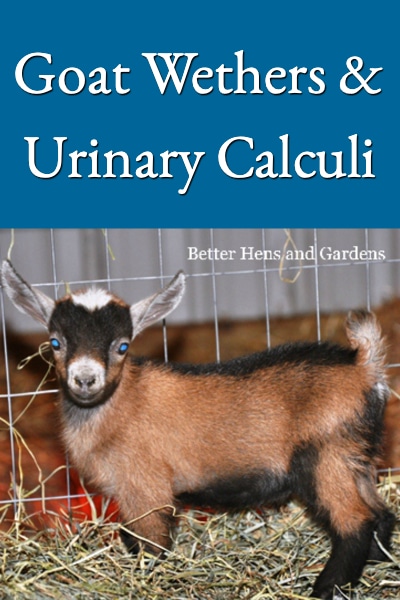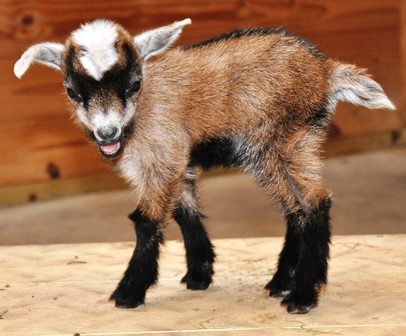
Several readers of Better Hens and Gardens have been surprised and a bit concerned about the fact that we wait to band goat bucklings (see this article for how we do it: Wethering Goats via Banding) until they are that old. However, there is a good reason for waiting and not banding them too soon
Why We’re Concerned About Goat Wethers & Urinary Calculi
Male goats can develop a condition called urinary calculi. It is serious and can rapicly become fatal.
With urinary calculi, the goat develops stones (like kidney stones in a human) that prevent it from urinating. If the blockage is not removed, the goat’s bladder will rupture and the goat will die. It can be difficult to remove the blockage, so it’s best to prevent it from happening.
Urinary calculi is usually caused by feeding too much grain and not enough roughage, an imbalance in minerals, banding wethers too soon, or a combination of all three.
When a buckling is wethered, the hormones that cause the urinary tract to grow slow down significantly. Therefore, if a male goat is wethered too soon, the urinary tract may be very small and increase the chance for blockage.
So, if you’re planning to own wethers, it’s best to wait to have them banded until they are at least ten to twelve weeks old.
When purchasing wethers, it’s a good idea to verify with the breeder that they will be banded at an appropriate age and wait the extra time before picking them up.
Most goat kids that are being bottle raised can leave for new homes within a few weeks of birth, while dam raised kids can usually leave at eight weeks (or after they have been fully weaned). For wethers, it’s better to wait a little longer to minimize the chance of urinary calculi.

Baby Bramblestone Charm Box
We’ve always waited the extra couple of weeks to wether any bucklings born at Bramblestone Farm, and as far as we know, none of them have developed urinary calculi. Waiting a few weeks longer before banding them and allowing them to leave seems like a small thing to do since it can so significantly affect their health for life.
Sandy Holmes says
My eight week old boy has one stone and not weathered yet. If he has stone at time of banding would it hurt him.
Lesa says
Hi Sandy, yes it could hurt him. When you wether a goat, the amount of testosterone being produced reduces and the size of the urinary tract can decrease by as much as 25% (according to some estimates). So, if you wether him at 8 weeks, not only has his urinary tract not had time to grow very large but it will likely decrease in size because of banding. If he’s already got a stone, that might be enough to cause complete blockage. I wouId recommend getting rid of the stone as well as waiting until 12 weeks for banding. I hope this helps.
stephanie says
my breeder said I can take the boys and bring them back after 12 weeks for the banding… is there a timeframe that they need to have it done by before they exhibit unwanted buck behaviors?
Heidi says
We’ve been struggling with UC in our 3.5 year old wether. One thing that can really help them is chewable vitamin C. I wish everyone with wethers knew this! River had surgery, and has had lots of Vit C shots, along with a complete diet change (hay and a small amount of timothy hay pellets with kelp and Ammonium chloride). And he gets 6 chewable vit c tabs a day (for a total of 3000 units). He is looking and feeling sooo much better, so he brother also gets preventative vitamin C every day now.
Lesa says
Hi Heidi, Thanks for the advice on the Vitamin C for urinary calculi, Hadn’t heard of that before and will have to check it out!
stephanie says
how many mg are you giving preventative?
cherie says
Great article….wish I’d read it before my first whether. I banded him too soon and lost him to uc. Too sad. Never want to go thru that again!
Lesa says
Hi Cherie, I’m sorry that happened to you, what a terrible experience.